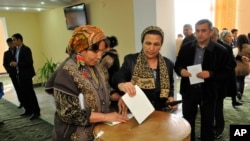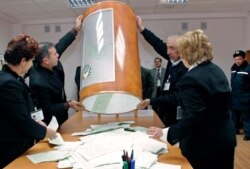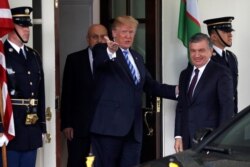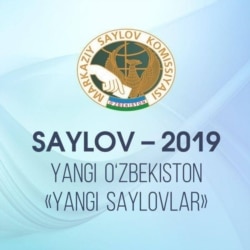After three years of steady but piecemeal reforms, the government of Uzbek President Shavkat Mirziyoyev faces its most demanding test yet -- to persuade the international community through parliamentary and local elections on Dec. 22 that it is truly committed to democratic change.
“We know the world is watching," says Mahmud Istamov, deputy chair of the Central Election Commission. "The Uzbek people tell us they want free and fair elections. We, the commission, want free and fair elections.”
The balloting will be the first since Mirziyoyev replaced the late Islam Karimov three years ago and introduced a reform agenda that has included an Election Code providing for fully transparent electoral processes and the right to vote for any candidate without pressure from the state. At stake is the makeup of the biggest parliament in Central Asia with 150 representatives and 100 senators -- all but 14 directly elected.
Elections in the region have been problematic since the breakup of the Soviet Union, with Kazakhstan, Tajikistan and Turkmenistan all orchestrating the voting in deeply rooted authoritarian systems. Only Kyrgyzstan is rated as “partially free” by Freedom House.
Some international monitoring has been allowed in Central Asia elections, typically by the Organization for Security and Cooperation in Europe (OSCE) and the United Nations, but their recommendations have rarely been followed. No Uzbek election has ever been rated as “democratic.”
Uzbek officials are aware of their country’s “dreadful image” and lack of credibility. But the Central Election Commission is promising “a new kind of election in a new Uzbekistan.”
In an interview with VOA's Uzbek Service, Istamov insisted that his commission is no “toy” of the government. "The only power that controls us is our country’s Election Code," he said.
The OSCE and U.N. both plan to monitor the elections. U.N. resident coordinator Helena Fraser argues that Uzbekistan is undergoing transformational change and says the U.N. is committed to assist in that process.
“We know there is a lack of public confidence in the rule of law ... We know that [tangible] steps need to be taken,” she said in an interview.
Washington strongly supports Mirziyoyev’s reforms and hopes these elections yield genuine political change. U.S. Ambassador Daniel Rosenblum describes a “very top-down” process. But like Fraser, Rosenblum believes the man at the top is determined to transform the country.
“Many of the [reform] ideas are coming from him or his administration but have to be implemented. Sometimes that process makes political reform harder to see. But I sense that [parliamentarians] feel a new responsibility to play a different role than in the past,” Rosenblum told VOA.
Still, the Uzbek blogosphere is filled with cynicism toward the five officially sanctioned parties, their platforms and candidates. Nevertheless, they have been interacting with media, engaging the public through social platforms, holding debates, running ads and actively campaigning throughout the country.
But public criticism demonstrates how far Uzbekistan has to go to internalize democratic norms. Many Uzbeks say they cannot discern one party from another, nor see them as offering new ideas or solutions. Instead, they view the parties as Potemkin groups, set up simply to create the impression of a multi-party system.
A more vigorous critique of the current government comes from Uzbek opposition groups which remain based outside the country, but these have been barred from participating in the election.
Sherzod Kudratkhodjaev, a leading member of the Central Election Commission, told VOA that "there is opposition inside the country—a new generation whose critical voice is increasingly heard in the political sphere and public debates. ... We want that kind of natural development, not some foreign-orchestrated opposition groups," he says.
Kudratkhodjayev says the existing parties, from liberal democrats championing economic freedom to conservatives advocating traditional Uzbek values, are shaping the political landscape. "Not everything the government wants gets approved or done today … Many bills and proposals are trashed in parliament because of opposition."
Deputy Senate chairperson Sodiq Safayev expects a more capable and effective parliament following this election.
“We want our partners to see changes in our country. There is no going back for us. Uzbekistan is on a path of openness and modernization,” Safayev says.
That is music to Washington’s ears: U.S. officials see Mirziyoyev as a modernizer whose reforms could come to fruition in the elections, even though the system still is run by people integral to the previous regime, which never allowed free elections.
Those who chose exile under Karimov view themselves as the heroes of Uzbekistan’s story, daring to question repression and advocate change. But Kudratkhodjaev argues that those who stayed worked to ensure the country did not fall too far.
Kudratkhodjaev, 45, served in Karimov’s press service and later was press secretary to then prime minister Mirziyoyev. When asked why he still serves, Kudratkhodjaev replies: "I have the professional and political experience. I understand this system and this society. I know where we should reform and change."
Boriy Alikhanov, leader of the Environmental Party, with a half-million new members, is confident that Uzbekistan has an opportunity to evolve.
“There is no magic wand … We have to go through a process that involves hard work, perseverance, patience and time and this will not be a linear process.”











